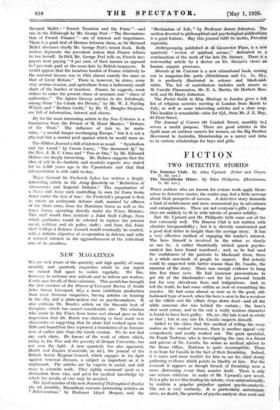FICTION
TWO DETECTIVE STORIES
The Marylebone Miser. By Eden Phillpotts. (Hutchinson. 7s. 6d. net.) WHEN authors who are known for serious work apply them- selves to detective stories, the reader may feel a little nervous about their prospects of success. A detective story demands
a kind of recklessness- and mere nonsensical joy in adventures.
and entanglements. These are not everyone's gifts ; perhaps they are unlikely to fit in with talents of greater solidity.
But Mr. Upward and Mr. Phillpotts both come out of the test extremely well. The Domino' Club is not written with absolute irresponsibility ; hut it is cleverly constructed and a good deal richer in insight than the average story. It has a very effective method of engaging the reader's interest. The hero himself is involved in the crime as closely as can be. A rather theatrically wicked quack psycho- analyst has been found murdered ; and, us he had . used the confidences- of his patients to blackmail them, there is a whole case-book of people to suspect. Rut nobody
could be suspected with better reason than Dr. Cassilis, the narrator of the story. There was enough evidence to hang him five times over. He had immense provocations to get rid of the blackmailer—not for his personal benefit but for very chivalrous fears and indignations. And, to tell the truth, he had come within an inch of committing the murder. He had come almost as near as in the good, old- fashioned type of novel, when the hero is seen to fire a revolver at the villain and the villain drops down dead—and all the
while someone else was behind the curtain ; the hero's shot went astray, and in the end a really noxious character is found to have been guilty. Oh, no ithe tale is not so crude
as that ; but at any rate Dr. Cassilis suspects himself.
Added to the claim that this method of telling the story makes on the readers' interest,, there is another appeal very scrupulously and neatly worked out. The great specialist, Sir Frank Tarleton, who is investigating the case, is a friend and patron of Dr. Cassilis, his senior as medical adviser to the Home Office. Tarleton is - quite -incorruptible. There is no hope for Cassilis in the fact of their friendship. Indeed, it is more and more terrible for him to see his chief slowly gathering evidence which points so blackly at him. For the
moment it appears as though breach 'of friendship were a more distressing event than murder itself. There is only one serious criticism to make of Mr. Upward's new novel.
It is a pity to sec him lending his talents, even unintentionally, to confirm a popular prejudice against psycho-analysts.
The act is very untimely. It is particularly unfortunate since, no doubt, the practice of psycho-analysis does need and deserve tEe most Careful and honest criticism: Still, this is no blot on the construction of the story.
Mr. Philipott's crime is more thoroughgoing. There are three murders, instead -of --one– There are two detectives engaged in solving- it, 'aild 'Multitudes of policemen to help them. Everything is given in good measure. But the appeal -is much the same in.the two books. Someone very nasty has -been killed, and we_ are not partieularly concerned in exacting .vengeance. But several. of our 'friencli are under suspicion, and we can't be happy until their names are cleared, or at least until they are out of harm's way. At first we are confused by the number of characters whom we Call by their Christian names ; it is hard to grow familiar so soon with so many acquaintances. When we have got them all straight the story runs quickly and well. There are excursions upon false trails, and surprising new developments ; but so there should be. Detective stories. are not written for people with vague memories or muddled heads.















































 Previous page
Previous page